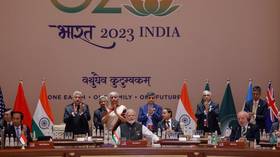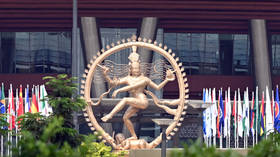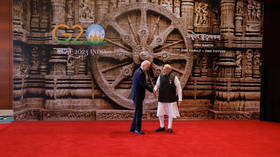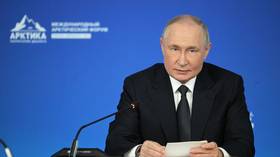G20 summit takeaways: Win for India, developing world, and multilateralism

As the G20 summit in New Delhi wrapped up, senior Indian journalists covering international affairs shared with RT some of their takeaways from the three-day summit. Media professionals acknowledged that India was able to maintain a balancing act between the West – with which it maintains a focused and beneficial partnership – and Moscow – which is treated like an old and tested friend – even if there was a vivid generational divide on this topic.
On the Ukraine conflict, there appears to be unanimity in India that while the hosts desire peace, their own interests must come first.
“I think even Western officials, who agreed to a declaration that didn’t contain criticism of Russia, were clear that they wanted to preserve the G20,” Suhasini Haidar, the diplomatic affairs editor of The Hindu, said. “The big win here is for multilateralism. The second win is for India’s presidency of G20, as both sides wanted to ensure success for India.”
“Neither Xi nor Zelensky addressed the summit by video link,” V Sudarshan, a columnist for the Deccan Herald and TheFederal.com, said. “Xi’s absence did not make a difference. The G20 meeting papered over their semantic differences without him.”
Vineeta Pandey, the diplomatic editor of The Asian Age, agreed. “Xi is under pressure domestically,” she said. “But no one will miss him as China is seen as a roadblock.”
“Interestingly, while the Russian and Chinese presidents haven’t come here, the language of the declaration reflected their position to the extent that no country is criticized to the extent as was in last year’s declaration in Bali,” Haidar added.
Xi may also have missed the summit for other reasons. “It might have been awkward for him given that the India-Middle East-Europe corridor was announced, which is an alternative to the Road and Belt Initiative,” Sudarshan pointed out. “He might have gotten an indication that it was in the works, so he stayed away.”
Priya Ranjan Dash, the former managing editor of the Financial Chronicle, felt that Prime Minister Narendra Modi played a role in not allowing the West to take advantage of Putin’s absence.
“Putin opted out before Xi and Biden thought this would open an opportunity to drive the outcome in Delhi,” Dash said. “But we have a strong leader in Modi. He won’t let it be one-sided. And Biden’s trip was already successful from the bilateral meeting, where India opened up further concessions to America.”
Pandey made a similar point about Putin. “We have our annual bilateral with Putin, which goes off nicely,” she said. “He’s already spoken to Modi.”
She added that India could not afford to lose Russia’s goodwill. “No one can forget their role in the 1971 war,” she said. “And Russia’s 100th veto at the UN was on an anti-India resolution on Kashmir.”
However, this may change. “In India, there is a division between the older generation and the younger one,” Sudarshan explained. “The older one grew up with regard for Russia. But, in the last 20 years, a new generation has emerged with different feelings. For instance, it was only when we pulled out those medical students from Ukraine after the conflict began that we found out how many Indians were there. Ukraine is not a top-of-the-mind issue for the average Indian.”
“There is sympathy for Ukraine’s plight,” Samrat Choudhury, a journalist and the author of ‘Northeast India: A Political History’, said. “Overall, the idea that India should remain neutral has wide acceptability across the political spectrum. Both the left and the right agree that India should not actively involve itself at this point … Modi would have liked to have negotiated peace. But how long this war will take, who knows?”
According to journalist and political commentator Ullekh N.P., the G20 summit under India’s presidency “wasn’t allowed to become a forum to settle geopolitical scores,” unlike in Bali last year, where the Ukrainian president gave a virtual address.
“It doesn’t mean one or another leader should not appear in a forum, but then, the focus is lost; it shifts away from what should be discussed in the meeting, and G20 is a forum to mainly discuss economic issues,” Ullekh told RT. He, however, suggested that even as G20 leaders reach a consensus on issues like climate and food security, this won’t necessarily create a shift in their policies regarding Ukraine.
Sudarshan, too, was skeptical about the G20 declaration on Ukraine. “Paragraph 14 is a one-liner: ‘Today’s era must not be one of war,’” he noted. “It’s like a film dialogue. How difficult is it to come up with words that make the statement acceptable? And no matter what you say, it changes nothing on the ground.”
He admitted, however, that there was a difference. “Initially there was a lot of criticism from the West over our oil trade and grain sales by Russia,” he said. “Now that has all disappeared, and they have come to accept it by themselves. Now, the West is arguing for movement of grain for the Global South.”
Haidar agreed. “The voice of the Global South seems to have become more pronounced, and other countries are now talking about it even though the Global South was irrelevant to G20 earlier,” she said. “PM Modi himself said that India tries to bring together the Global North and the Global South, East and West, and India stands at the crossroads. Geography is as important as history. The historical circumstances can never completely overcome geography, and India will continue its balancing act simply because of that.”
















